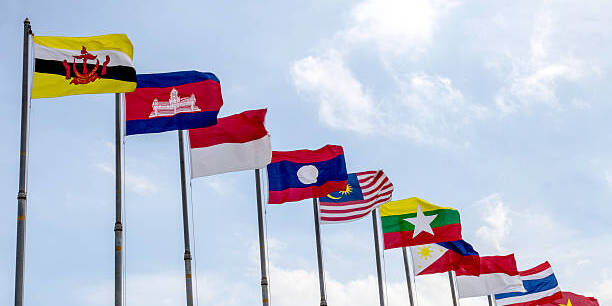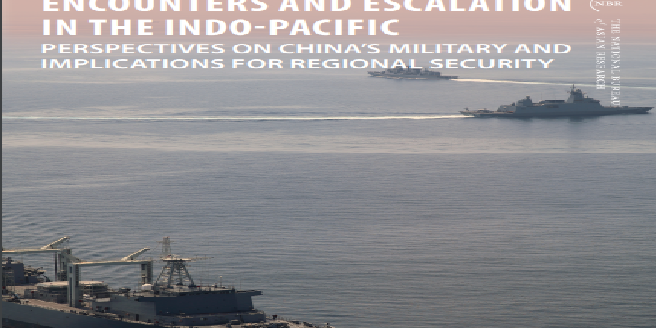Author: Jeffrey Ordaniel and Carl Baker, for Pacific Forum
Executive Summary
The U.S.-Japan-Philippines Trilateral Maritime Security Dialogue conducted in December 2022 confirmed that there is very little difference in threat perceptions regarding the East and South China Seas. The three countries view China’s increasingly assertive claims to the territories and maritime zones in the two bodies of water as antithetical to their shared vision of a free, open, and rules-based Indo-Pacific. China’s rapid military expansion, including unprecedented nuclear weapons and missile buildup, reinforces the urgency of the threat. Japanese and Philippine interlocutors worry that as China approaches nuclear parity with the United States, the region’s strategic environment will worsen. American participants emphasized greater and tangible demonstration of alliance commitments and agreed that some risk-taking is required to push back against Chinese coercion. There was a consensus about the challenge of addressing Beijing’s gray zone activities that have so far succeeded in seizing territories and maritime areas in the South China Sea and establishing regular intrusions into Japanese waters in the East China Sea. Participants struggled to find a strategy to blunt China’s salami-slicing tactics while avoiding escalation and armed conflict.
Key Findings & Recommendations
The geographic locations of the Philippines and Japan make them frontline allies in addressing maritime security challenges brought about by an increasingly assertive China. Long term, Chinese coercion is expected to worsen as it commissions new vessels, deploys sophisticated missile systems, and approaches nuclear parity with the United States. The three countries should be willing to take some risks to prevent China’s coercion from succeeding. The alliances need to be reinforced through more explicit demonstration of commitments. Discussion between these countries on the strategic implications of Beijing’s rapid nuclear and missile buildup should commence. The dialogue emphasized these findings, among other takeaways.
Finding: One function of Beijing’s gray zone operations is to test the resolve of other claimants and the United States, hoping they prioritize de-escalation to avoid armed conflict and eventually back down. During a “gray zone” crisis, prioritizing de-escalation when China escalates will likely result in fait accompli, with Beijing gaining more maritime spaces and territories.
- Recommendation: The United States, Japan, and the Philippines should be willing to take some risks (for example, by conducting operations to get past a blockade instead of abandoning the mission) to prevent China’s coercion from succeeding.
Finding: Chinese gray zone coercion in the South China Sea follows a pattern. Militia vessels first establish a presence in another country’s exclusive economic zone (EEZ), inside the nine-dash line. Since they pose as fishing vessels, they force other claimants to consider two difficult options: either conduct law enforcement operations against the vessels, risking tension with China or simply monitor and record. CCG vessels and occasionally PLA Navy vessels anchor close by to deter other claimants from taking action.
- Recommendation: Operationally, the United States and its allies should consider abandoning the concept of gray zone and instead draw a clear line between benign peaceful activities and non-peaceful activities to encompass operations carried out by civilian agents taking orders from military agencies.
- Recommendation: Instead of identifying China’s actions as being in the gray zone, which leads to confusion about how to respond without risking armed conflict, the United States and its allies should instead match the escalation and turn the tables on China, for instance by reinforcing presence to maintain the status quo, instead of focusing on ways to de-escalate and end the crisis.
Finding: When Washington committed to the Japan- administered Senkaku Islands in 2014 and refused to offer the same to Philippine-administered land features in the South China Sea, the credibility of the U.S.-Philippine alliance significantly decreased, which resulted in more Chinese assertiveness and stronger voices in the Philippines calling for an accommodation of Chinese security preferences.
- Recommendation: The United States needs to become more willing to commit explicitly to existing defense treaties during crises to increase deterrence while also compelling China to reverse course.
Finding: There are legal constraints to Japan’s response to China’s gray zone challenges. For instance, the JCG is legally mandated to conduct law enforcement operations against fishing vessels, and even against militia vessels, as they are not sovereign immune vessels. The JMSDF is in charge of maritime security operations but is only allowed to act when the JCG cannot manage a specific threat and when the defense minister has given an order. The JCG cannot conduct law enforcement operations against CCG vessels, which are sovereign immune vessels. However, the JMSDF also cannot conduct maritime security operations against CCG vessels because they are not considered warships by the Japanese government. Meanwhile, the U.S. military has made clear since April 2019 that it would make no distinction between Chinese Coast Guard and militia boats and PLA Navy ships.
- Recommendation: The United States and Japan should discuss the roles of JCG, JMSDF, and U.S. Forces Japan during crises to cope with political constraints and mitigate the operational implications of legal gaps.
Finding: Beijing’s unprecedented nuclear weapons build-up is integral to China’s long-term maritime security goals in Southeast Asia. The trajectory of China’s nuclear weapons build-up predicting a stockpile of about 1,500 warheads by 2035 and reaching nuclear parity with (if not nuclear superiority over) the United States, could shape the cost-benefit calculations of U.S. allies and partners.
- Recommendation: The United States should make investments and not allow China to achieve nuclear superiority while also commencing discussions with Japan on nuclear deterrence and nuclear sharing and with the Philippines on its appetite for a nuclear umbrella in exchange for greater U.S. access to Philippines bases.
Finding: The biggest challenge for Japan and the U.S.- Japan alliance vis-à-vis gray zone coercion in the East China Sea is that CCG vessels are sovereign immune vessels and, therefore, cannot be subjected to ordinary law-enforcement operations. China would see JMSDF conducting maritime security operations against warships as an act of war and could trigger escalation toward armed conflict.
- Recommendation: Japan should reconsider CCG vessels’ sovereign immunity since intrusion into the Japanese territorial sea to assert territorial jurisdiction is a violation of Japan’s sovereignty. This could mean taking considerable risks by maneuvering to physically challenge the presence of Chinese government vessels inside the Japanese territorial sea or block any resupply mission. Any risk-taking should be fully coordinated with the United States to avoid a mismatch in expectations.
Finding: U.S. and Japanese participants diverged on how they perceived the usual refrain of not taking sides on sovereignty issues that accompany U.S. statements related to territorial disputes in the region. Some Japanese participants view the wording as unnecessary and worry it could give the impression that U.S. commitment is weak.
- Recommendation: The United States should word statements to highlight the source of tension and Washington’s strong alliance commitments.
Finding: Winning the information war is critical to holding China to account for its assertive behavior.
- Recommendation: Philippine and Japanese militaries and coast guards should invest in surveillance hardware and facilitate the release of data (including photographs, satellite data, and videos) to the public. Data should be released after an incident in a matter of hours, not days or weeks. Doing so would put Chinese propagandists on the defensive and not dominate the information domain. The United States should assist in providing ISR data and ensuring full maritime domain awareness.
Finding: The United States now has a clear position on maritime claims in the region. In July 2020, Washington explicitly stated that it does not recognize China’s nine- dash line claim, effectively reversing its position on maritime claims. The new U.S. policy on maritime entitlements mirrors the decision of the 2016 Arbitral Tribunal that ruled in favor of the Philippines. This could have implications for the ongoing negotiation for a joint U.S.-Philippine patrol in the South China Sea.
- Recommendation: The U.S. Coast Guard and Navy should join their Philippine counterparts in patrolling areas identified in the 2016 Arbitral Tribunal as part of Philippine entitlements.
Finding: Funding remains an issue for the modernization of Philippine forces. While the Philippine Navy continues to procure more modern platforms, budget constraints slow the process. Japan has made the PCG the largest in Southeast Asia in terms of the number of surface assets, but PCG vessels lack modern weapon systems necessary for law enforcement. Japan cannot provide weapon systems because of institutional constraints.
- Recommendation: The United States and Japan should consider a burden sharing-arrangement to help the Philippines safeguard its maritime entitlements in the South China Sea. Japan should continue to provide the platforms, while the United States provides the weapon systems. Also, the United States can focus its foreign military financing on modernizing the Philippine Navy while Japan can focus its resources on helping the civilian maritime agencies in the Philippines, such as the PCG and the Bureau of Marine and Aquatic Resources (BFAR), increasing their presence in the South China Sea, and developing overall capabilities.
Click here to access the full paper at Pacific Forum.
This policy paper is a part of the Pacific Forum’s Issues & Insights Vol. 23, CR1,
Dr. Jeffrey Ordaniel is non-resident Adjunct Fellow and Director for Maritime Security at the Pacific
Forum. Concurrently, he is also Associate Professor of International Security Studies at Tokyo
International University (TIU) in Japan. He holds a Ph.D. in International Relations and specializes in the
study of offshore territorial and maritime entitlement disputes in Asia. His teaching and research revolve
around maritime security and ocean governance, ASEAN regionalism, and broadly, U.S. alliances and
engagements in the Indo-Pacific. From 2016 to 2019, he was based in Honolulu and was the holder of the
endowed Admiral Joe Vasey Fellowship at the Pacific Forum. Since 2019, Dr. Ordaniel has been
convening the Indo-Pacific Maritime Security Expert Working Group, an informal network of select
experts and scholars from Japan, Southeast Asia, Australia and North America, with the aim of
generating sound, pragmatic and actionable policy prescriptions for the region. His current research on
maritime security in Asia is funded by the Japan Society for the Promotion of Science (JSPS), 2020-2022.
Carl Baker is senior adviser at Pacific Forum in Honolulu, Hawaii. Previousy, Mr. Baker served as the
Forum’s Executive Director and as coeditor of Comparative Connections. He is a member of the Council
for Security Cooperation in the Asia-Pacific (CSCAP) and engaged in promoting security cooperation in
the Asia-Pacific region as a participant in several CSCAP Study Groups. Current focus areas include
preventive diplomacy, multilateral security architecture, nonproliferation of weapons of mass
destruction, and nuclear security. Previously, he was on the faculty at the Asia-Pacific Center for Security
Studies and an adjunct professor at Hawaii Pacific University. Publications include articles and book
chapters on U.S. alliances and political developments in South Korea and the Philippines. A retired U.S.
Air Force officer, he has extensive experience in Korea, having served as an international politicalmilitary affairs officer for the UN Military Armistice Commission and as a political and economic
intelligence analyst for U.S. Forces Korea. He has also lived for extended periods and served in a variety
of military staff assignments in Japan, the Philippines, and Guam.
About this report
Pacific Forum, with support from the Defense Threat Reduction Agency (DTRA) organized the inaugural Track 2 U.S.-Japan- Philippines Trilateral Maritime Security Dialogue on December 1- 2, 2022. Strategic thinkers from the United States, Japan and the Philippines, including scholars, policy experts, and retired military and government officials, participated in the dialogue. This report contains the general summary of the discussions.
The recommendations contained in this report, unless otherwise specifically noted, were generated by the discussions as interpreted by the Principal Investigators. This is not a consensus document. All participants attended in their private capacity.
The statements made and views expressed in this publication do not necessarily reflect the views of the Pacific Forum, the project sponsors, or the dialogue participants’ respective organizations and affiliations. For questions, please email jeffrey@pacforum.org.


